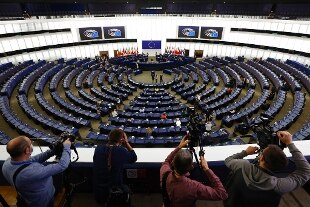Share
by Tiziana Di Giovannandrea
07 June 2021David Sassoli, President of the European Parliament, inaugurated the first plenary session "in presence" of the assembly after 15 months of remote work.
The return of the European Parliament to Strasbourg in its historic seat represents a return to normality, after the months of the pandemic exile, but the vision of the hemisphere of the plenary hall practically empty at the beginning of the session is presented to the eyes.
"It is satisfying to see, after 15 months of pandemic, trust in Europe grow in the public opinion of our 27 countries. We must not disperse the pain and sacrifice of our citizens. Today, Strasbourg is once again a symbol of restart". With these words, pronounced in French and with some emotion, David Sassoli, President of the European Parliament, inaugurated the first plenary session "in presence", receiving applause from the classroom. "Strasbourg is a symbol of European unity, peace and diversity. It is in this land that the absolute need for Europe is born". said David Sassoli.
"All our countries have stopped and together with all our countries, the world has stopped"
"This is a very important day for the European Parliament - continued Sassoli -. After 15 months, we return to the seat of our plenary in Strasbourg. We have experienced a terrible time that has caused millions of deaths and human suffering, upsetting the daily life of the people and putting many of our citizens in a difficult economic and social situation. All our countries have stopped and together with all our countries, the world has stopped. Resuming our normal activity in Strasbourg is a sign of trust and hope for everyone, with the contribution of all of us: MEPs, political groups, staff, we have kept our institution running and guaranteed the European Union to be able to take initiatives to protect our citizens ". "The European Parliament - continued Sassoli - had to adopt extraordinary measures and new working methods, but allowing our assembly to exercise its functions and use its prerogatives "." The Parliament - continued Sassoli - has always stressed the need to to emerge from this crisis stronger and more united, ensuring a just and equitable environmental and digital transition and building a more egalitarian society, where the most vulnerable among us - who have also been the most affected during this period - will not be left behind. With parliamentary activity, we have contributed to improving all the tools for exiting the crisis: the Next Generation Eu, the Recovery and Resilience Facility, the rule of law and conditionality, the seven-year budget and own resources.We will continue to do our part on the climate law, the digital agenda and the immigration and asylum pact. Now that we are back in our home in Strasbourg, I would like to thank the French authorities for their support and cooperation in recent months and the citizens of Strasbourg for their understanding and constant hospitality - and I greet the mayor who is present with us. ".
The
mayor of Strasbourg Jeanne Barseghian
he predicted a "gradual" return to normality: the next session in July - estimated the exponent of the French Greens, of distant Armenian origins, who leads the Alsatian city, "will be regular". Strasbourg "has been living to the rhythm of the sessions of the European Parliament for many years" and the mayor Jeanne Barseghian, elected in July 2020, welcomes for the first time "with joy" the return of parliamentary meetings after 15 months of remote work and in Brussels. According to the first citizen "even if we are still in a hybrid format, I expect the arrival of at least half of the deputies, between 350 and 400". For Mayor Barseghian, the pandemic "was a severe blow to our city",given that every month Strasbourg welcomes for the duration of the sessions a few thousand people in addition to the 705 deputies: "A beautiful European ecosystem has been created, which also affects the work of the Council of Europe and the Court of Human Rights" , the other institutions not linked to the EU but based in Strasbourg.
The format is still "hybrid" and attendance will be reduced, also due to the persistence of obstacles to mobility between European countries. Strasbourg is the institutional seat, one week a month, of the European Parliament. Reaching it, however, is a logistical challenge: far from all the capitals, its airport is poorly served and you can usually get there by car or train from Brussels, Paris or Frankfurt. Now the limitations due to the pandemic make the undertaking even more difficult. The high costs of the monthly transfer of people and documents from Brussels have always fueled controversy in 'euro skeptical' circles and not only, but every attempt to bring back all the plenary sessions of the only elected body of theEU in Brussels, where all the institutions and offices have their headquarters, has always been rejected by France, which does not want to lose the prestige and earnings of an important, albeit seasonal, community headquarters.

